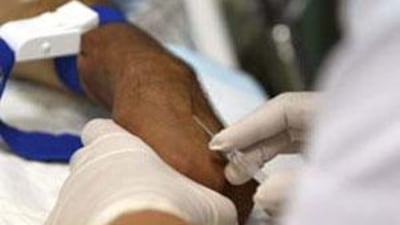ABU DHABI // The GCC has issued infection-control guidelines in an effort to unify regional standards and reduce the number of potentially life-threatening infections acquired in hospitals. The Middle East Centre for Infection Control and Disinfection Technology in Jordan puts the percentage of people who acquire infections in regional hospitals at between 15 and 20 per cent, compared with 10 to 14 per cent in Europe.
"It is much higher than the level in other places," said Dr Iyad Hijjawi, the general manager of the centre. "The biggest problem we are facing in the GCC is we lack any surveys or statistics from the public or private sector," he said. "Very, very few professionals log the prevalence of hospital-acquired infections." "You need to know what the problem is in order to solve it," he said. The initiative comes as one of the largest hospitals in the UAE disclosed the results of its first year of screening for MRSA, a common bacterium in hospitals that is known as a "superbug" because of its resistance to certain drugs.
Al Mafraq Hospital in Abu Dhabi has introduced wide-ranging measures to identify cases of MRSA, including screening new and long-stay patients, and says it detected 62 cases last year. Dr Hijjawi said it was vital that national governments put the control of hospital-acquired infections at the top of their health agendas; if they did, he said, it would save lives as well as money. The GCC initiative was a step in the right direction, he said, but each country needed to develop its own policy.
The guidelines, the first set of regional policies in the Middle East to address the problem, have taken a year to finalise and are currently on the "printing presses", according to Dr Ziad Memish, the director of the GCC's Centre for Infection Control. "The first point is to standardise the practice," he said. "We have spoken to experts, and used the expertise in the region, and put in place standards, policies and procedures to govern infection control.
"It took a lot of effort to get everyone to agree on them." The guidelines address such issues as staff immunisation, basic hygiene procedures, waste disposal, clothing, cleaning processes and reporting techniques. In the capital emirate, infection control is the responsibility of the Health Authority - Abu Dhabi (HAAD). A comprehensive policy is already in place and has been reviewed by the Joint Commission International, a healthcare accreditation organisation. According to Dr Jamal al Kaabi, head of the hospital and clinical inspection section, there are plans to improve it.
Under the Policy on Infection Control in Health Care Facilities, published in May 2007 and due to be reviewed and, if necessary, amended in May, all healthcare centres must have infection-control plans, policies, procedures and guidelines. "The goal of the infection-control policies is to identify and reduce risks of acquiring and transmitting infections among patients, staff, students, volunteers, contract service workers and visitors," the policy states.
Dr Kaabi said inspectors had been asking to see individual infection-control plans, but that now they would be focusing on their implementation. "Sometimes the problems are very obvious, such as using unsterilised equipment or not using the correct soap," he said. "The main problem is that people do not comply with the policies. It is when infection control itself is not controlled that problems arise."
Dr Kaabi said HAAD, which is authorised to close delinquent hospitals, was now concentrating on deficiencies in infection control and organising more medical lectures to help educate medical professionals. Dubai has its own policies, and a spokesman for the new Dubai Health Authority said infection control was an important focus for the organisation. "The DHA is responsible for building on existing provisions to ensure that there is a suitable strategy in place to deal with all aspects of disease prevention and infection control," he said.
The spokesman added that the DHA was working with a number of other Government departments, such as Dubai Municipality, to continue to develop best practices and policies. No one was available to comment at the Ministry of Health, which is responsible for the northern emirates. But a former employee at the ministry accused the Government of not being sufficiently proactive in creating and adopting federal policies for infection control.
"How can you follow someone else's guidelines if you do not know what the problem is and you do not have your own guidelines? asked Dr Mansour al Zarouni, head of pathology and laboratory medicine and chairman of the Infection Control Committee at Al Qassimi Hospital in Sharjah. "This is something the Ministry of Health should have done first. I put a proposal for an infection-control plan to them three years ago and they said they are still studying it."
Dr Zarouni called it "shocking" that the ministry did not have an infection-control department, or even its own protocols and guidelines. He recalled a recent incident in a government hospital in the northern emirates that, he said, illustrated how bad infection problems could become if they were not properly managed. "I went to the hospital's neonatal intensive care unit and found that they had a severe infection," he said. "We discovered this had been around for eight years, but they were not aware of it. This is why it is so important to have an infection-control team in every hospital who know what to look for."
munderwood@thenational.ae

